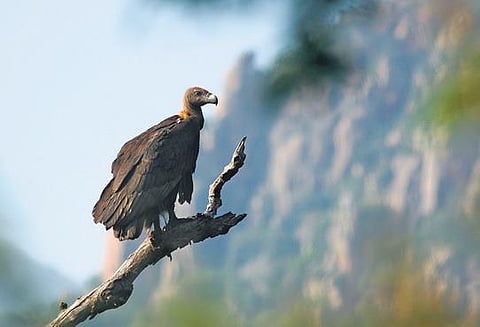

CHENNAI: There are 246 vultures spread across Tamil Nadu, Karnataka and Kerala, the first-ever synchronised census on the bird carried out last month has found. While the finding would be subjected to further scientific scrutiny to establish whether the bird’s population is on the decline or is stable, the Tamil Nadu forest department said that in Mudumalai Tiger Reserve (MTR) – which is the prime nesting habitat for vultures -- the count has gone down “drastically” in some traditional sites. On the other hand, nesting has been recorded for the first time in Sathyamangalam Tiger Reserve (STR), it added.
As per the census report, a copy of which was accessed by TNIE, Tamil Nadu continues to remain a favourite nesting and roosting ground for vultures among all three states, with MTR alone accounting for 98 of the bird species. The 98 includes the rare sighting of two Egyptian vultures and one Himalayan vulture.
The Bandipur and Nagarhole tiger reserves -- both in Karnataka -- recorded a combined population of 94 vultures while Wayanad Wildlife Sanctuary in Kerala is home to 52 vultures. Interestingly, out of the total 34 nests enumerated, a whopping 32 are in Tamil Nadu.
Chief Wildlife Warden Srinivas R Reddy told TNIE that Moyar valley in MTR is the prime nesting habitat for vultures while the sites in Kerala and Karnataka are used as foraging ground. "The synchronous census has yielded good baseline data for us. We are planning for a repeat exercise in May which is when the vulture fledglings take their first flight. All three states agreed to conduct the census biannually every year."
On likely positive intervention, Reddy pointed to the white-rumped vulture, which is the commonly observed species, along with the long-billed vulture and the red-headed vulture, in the region.
White-rumped vulture’s population is under stress, especially in few traditional nesting sites like Siriyur in Mudumalai, owing to loss of a particular tree cover -- Terminalia arjuna. "This species builds its nests on this particular tree, whose cover has reduced dramatically due to various reasons. I visited the site recently and we will be shortly taking steps to improve the tree cover," Reddy said.
As per the census, only two nests with four adult white-rumped vultures were found in Siriyur. The same observations were made by a team led by B Ramakrishnan from the Department of Wildlife Biology at Government Art College in Udhagamandalam, which is into long-term monitoring of the vulture population in Tamil Nadu.
The forest department is also planning to place camera traps to understand the feeding patterns of vultures. "When an animal dies, we will do a post-mortem and ensure the carcass is free of any diseases and then leave it for the vultures to feed upon. The exercise will tell us which type of carcass attracts the vultures and their feeding pattern," Reddy said.
S Bharathidasan, member of the State-level Vulture Conservation Committee and co-founder of NGO Arulagam, said: "This census has given some useful insights. My team recorded the first-ever nesting in STR which is heartening. I request the forest department to undertake long-monitoring through satellite tracking."